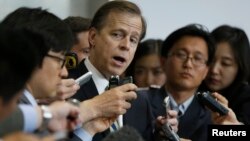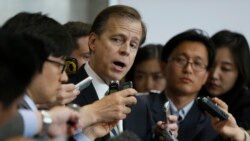“I am here in South Korea to talk to the Republic of Korea government about how best to send the right signals to North Korea so that it understands that it should get away from this . . . endless cycle of provocations, followed by periods of silence, followed by more provocations,” U.S. Department of State’s Special Representative for North Korea Policy Ambassador Glyn Davies said recently in Seoul when answering questions from journalists.
“Sometimes North Korea creates the impression that they are easing tension because they cease doing provocative and dangerous and destabilizing things. But I do not think that is the same as easing tension . . . Easing tension and making diplomatic progress will come when North Korea begins to live up to its obligations and . . . gets back on the path of diplomacy and denuclearization.”
Ambassador Davies is leading an U.S. delegation to North Asia that also included stops in China and Japan from May 12 to 18, 2013.
The Bank of China’s recent announcement to close the account of North Korea’s Foreign Trade Bank is a “potentially important development,” Ambassador Davies said. “Steps are being taken by a number of Chinese banks. I plan . . . to talk to Chinese officials about [these] steps . . . and see if there are not more ways that we can send very strong, united signals to North Korea that it is time to . . . return to the path of denuclearization and . . . to demonstrate that they are serious about . . . [getting] back to diplomacy.”
“I find it a . . . hopeful sign,” Ambassador Davis continued. “China . . . [has its] own set of interests in North Korea. They have a unique relationship with North Korea . . . From the American perspective it looks as if [Chinese] thinking continues to evolve [on North Korea].”
Ambassador Davies said that the five parties, (the United States, South Korea, North Korea, Japan, and China) “should find ways to work together. ... We all have the same interest in seeing progress made, and seeing progress in particular on denuclearization.”
“Sometimes North Korea creates the impression that they are easing tension because they cease doing provocative and dangerous and destabilizing things. But I do not think that is the same as easing tension . . . Easing tension and making diplomatic progress will come when North Korea begins to live up to its obligations and . . . gets back on the path of diplomacy and denuclearization.”
Ambassador Davies is leading an U.S. delegation to North Asia that also included stops in China and Japan from May 12 to 18, 2013.
The Bank of China’s recent announcement to close the account of North Korea’s Foreign Trade Bank is a “potentially important development,” Ambassador Davies said. “Steps are being taken by a number of Chinese banks. I plan . . . to talk to Chinese officials about [these] steps . . . and see if there are not more ways that we can send very strong, united signals to North Korea that it is time to . . . return to the path of denuclearization and . . . to demonstrate that they are serious about . . . [getting] back to diplomacy.”
“I find it a . . . hopeful sign,” Ambassador Davis continued. “China . . . [has its] own set of interests in North Korea. They have a unique relationship with North Korea . . . From the American perspective it looks as if [Chinese] thinking continues to evolve [on North Korea].”
Ambassador Davies said that the five parties, (the United States, South Korea, North Korea, Japan, and China) “should find ways to work together. ... We all have the same interest in seeing progress made, and seeing progress in particular on denuclearization.”






